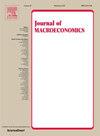Monetary regimes and regional economies: A counterfactual perspective from two euro opt-outs
IF 1.5
3区 经济学
Q3 ECONOMICS
引用次数: 0
Abstract
This paper investigates the counterfactual impact of an alternative monetary regime on regional income and disparity within Denmark and Sweden, two EU countries that opted out of the euro at its introduction in 1999, using the synthetic control method. Our findings reveal that counterfactual income trajectories would have been highly heterogeneous: while most Danish regions would have experienced modest losses or gains, some Swedish regions might have recorded lower income levels under the counterfactual, although the evidence is mixed and concentrated in a small number of non-capital regions. We further analyze these outcomes in light of standard theories of monetary unions, finding that regions more open to trade and with greater capital intensity would have been more likely to benefit. Finally, we assess the implications for regional inequality, showing that the current monetary regime was associated with reduced regional income disparities in Denmark and produced mixed effects in Sweden.
货币制度和区域经济:从两个选择退出欧元区的反事实视角
本文使用综合控制方法研究了替代货币制度对丹麦和瑞典这两个在1999年引入欧元时选择退出的欧盟国家的区域收入和差距的反事实影响。我们的研究结果表明,反事实的收入轨迹将是高度异质性的:虽然大多数丹麦地区将经历适度的损失或收益,但一些瑞典地区可能在反事实的情况下记录了较低的收入水平,尽管证据是混合的,并且集中在少数非首都地区。我们根据货币联盟的标准理论进一步分析了这些结果,发现对贸易更开放、资本密集度更高的地区更有可能受益。最后,我们评估了对地区不平等的影响,表明当前的货币制度与丹麦地区收入差距的缩小有关,并在瑞典产生了混合效应。
本文章由计算机程序翻译,如有差异,请以英文原文为准。
求助全文
约1分钟内获得全文
求助全文
来源期刊

Journal of Macroeconomics
ECONOMICS-
CiteScore
2.50
自引率
7.10%
发文量
53
审稿时长
76 days
期刊介绍:
Since its inception in 1979, the Journal of Macroeconomics has published theoretical and empirical articles that span the entire range of macroeconomics and monetary economics. More specifically, the editors encourage the submission of high quality papers that are concerned with the theoretical or empirical aspects of the following broadly defined topics: economic growth, economic fluctuations, the effects of monetary and fiscal policy, the political aspects of macroeconomics, exchange rate determination and other elements of open economy macroeconomics, the macroeconomics of income inequality, and macroeconomic forecasting.
 求助内容:
求助内容: 应助结果提醒方式:
应助结果提醒方式:


